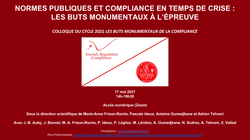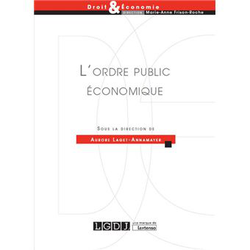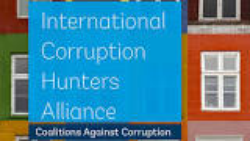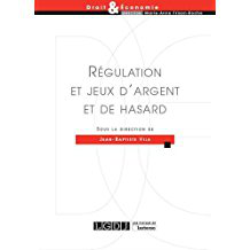Feb. 2, 2023
Thesaurus : Doctrine
► Référence complète : Ch. Beaucillon, « Sanctions internationales, coercition économique et souveraineté», Revue Droits, PUF, 2023/1, n°77, pp.183-196.
____
🦉Cet article est accessible en texte intégral pour les personnes inscrites aux enseignements de la Professeure Marie-Anne Frison-Roche
________
Updated: Feb. 2, 2023 (Initial publication: March 31, 2021)
Thesaurus : Doctrine

► Full Reference: E. Silva-Romero and R. Legru, "Quelle place pour la Compliance dans l'arbitrage d'investissement ?" ("What place for Compliance in investment arbitration?"), in M.-A. Frison-Roche (dir.), La juridictionnalisation de la Compliance, coll. "Régulations & Compliance", Journal of Regulation & Compliance (JoRC) and Dalloz, 2023, p. 281-293.
____
📕read a general presentation of the book, La juridictionnalisation de la Compliance, in which this article is published
____
► The summary below describes an article that follows an intervention in the scientific manifestation Compliance et Arbitrage, co-organised by the Journal of Regulation & Compliance (JoRC) and the University Panthéon-Assas (Paris II). This conference was designed by Marie-Anne Frison-Roche and Jean-Baptiste Racine, scientific co-directors, and took place in Paris II University on March 31, 2021.
In the book, the article will be published in Title II, devoted to: Compliance et Arbitrage.
____
► Summary of the article (done by the Journal of Regulation & Compliance): The authors emphasize the new and growing place of Compliance in International Arbitration, particularly in the requirement of respect for ethical values, since arbitrators can implement Ethics, sometimes lacking in international trade, or even must put their power only at the service of investors who respect the Rule of Law.
Thus, Compliance is deployed through the classic control by the arbitrators of the legality of the investment, which applies both to the establishment of the treaty itself and to the investor. In a more recent way, the arbitrator can control about an investment project a sort of "social license to operate" of the investor, concept related to the social responsibility of the companies, appeared for the protection of the peoples indigenous. Moreover, Compliance can justify a substantial assessment by the arbitrator of the effective respect of the human rights and the environment protection via an investment treaty, the State party remaining able to act for the effectiveness of these concerns.
________
Sept. 1, 2022
Thesaurus : Doctrine

► Full Reference: M.-E. Boursier, "Les buts monumentaux de la compliance : mode d'expression des États" ("Compliance Monumental Goals: States' mode of expression"), in M.-A. Frison-Roche (ed.), Les Buts Monumentaux de la Compliance, coll. "Régulations & Compliance", Journal of Regulation & Compliance (JoRC) and Dalloz, 2022, p. 467-474.
____
📕read a general presentation of the book, Les Buts Monumentaux de la Compliance, in which this article is published
____
► Summary of the article (done by the Journal of Regulation & Compliance): "Monumental goals" are the raison d'être of Compliance and give it meaning: they are enriched with a political objective making it rise to the status of true legal norms. Compliance Law emerged from the confrontation of States with globalisation, leading to an eviction of traditional legal notions. The monumental goals are the expression of public policies that can be deployed in such a context, thanks to the articulation that Compliance builds with private stakeholders, who spontaneous or constrained contribute.
Through this new Law, States regain their agility face to markets. Indeed, these monumental goals justify this new responsibility weighing on the companies and the new powers that the States express beyond their traditional borders.
________
June 15, 2022
Publications

► Full Reference: Frison-Roche, M.-A.., La dynamique des Buts Monumentaux du Droit de la Compliance (("The Dynamics of the "Compliance Law Monumental Goals"), in Frison-Roche, M.-A. (dir.), Les buts monumentaux de la Compliance, series "Régulations & Compliance", Journal of Regulation & Compliance (JoRC) and Dalloz, to be published.
____
► English Summary of this Article: This article constitutes the afterword of the book Les buts monumentaux de la Compliance.
Its purpose is to show the consistency of the book, in that the Monumental Goals themselves, by their normativity, give Uniqueness to Compliance Law, giving it simplicity and strength.
Restituting each of the contributions and articulating them all in an overall demonstration, this article highlights this consistency of the Compliance mechanisms which join the primary function of the Law: the protection of human beings, now and in the future.
___
► read the presentations of the other Marie-Anne Frison-Roche's contributions in this book:
📝 Les Buts Monumentaux, cœur battant du Droit de la Compliance
📝 Définition du Principe de Proportionnalité et Définition du Droit de la Compliance
____
This article is free access.
Read the article in English⤵️
June 9, 2022
Thesaurus : Doctrine
Référence complète : M. Lambard, La soumission des entreprises multinationales au droit international public: étude des mécanismes privés de réception et d'exécution des normes internationales, thèse Lille, direction Ch. Beaucillon, 2022.
____
Résumé de la thèse (résumé fait par l'auteure) : Depuis les années 70, les activités transnationales des entreprises multinationales n'ont cessé de se développer, entrainant des difficultés certaines quant à leur régulation par les Etats et les organisations internationales. L'incertitude relative au statut des entreprises multinationales en tant que sujet du droit international n'a pas freiné l'adoption de divers accords internationaux et la consécration de normes de soft law qu'il conviendra de détailler avant d'en distinguer la nature et la portée, selon qu'elles s'imposent aux entreprises directement et/ou par le truchement de mécanismes privés de réception et de ré-interprétation.
La complexité de la structure des entreprises multinationales ainsi que la profusion des normes internationales destinées à en encadrer les activités pose ensuite la question de la capacité des Etats et des organisations internationales à imposer leur respect aux entreprises multinationales. Aux côtés des mécanismes nationaux et internationaux d'exécution du droit, des mécanismes privés d'exécution ou de mise en conformité ont également vu le jour.
Ils permettent aux entreprises d'organiser leur propre soumission au droit international d'une part, et de jouer le rôle d'auxiliaire pour imposer le respect de certaines normes aux entreprises avec lesquelles elles sont en relation d'affaire d'autre part. Il s'agira d'analyser ces techniques privées d'exécution du droit international pour en comprendre les enjeux. Parmi eux, se trouve celui de l'émergence d'une normativité d'origine privée, qui serait générée dans le cadre des mécanismes de conformité. Par exemple, afin d'éviter d'être sanctionnées, les entreprises multinationales procèdent à une surenchère de normes et de standards dans des domaines très variés, par exemple en matière de responsabilité sociale des entreprises (RSE). Dans le cadre des mécanismes privés de conformité, droit dur et droit mou, droit imposé et droit volontaire s'agrègent au sein de processus forgés sur une logique entrepreneuriale et non juridique. Le recours aux théories libérales du droit international permettra d'interroger l'impact de ces mécanismes privés sur le développement progressif du droit.
_____
June 1, 2021
Compliance: at the moment

May 17, 2021
Conferences

 Référence complète: Frison-Roche, M.-A., La place des entreprises dans la création et l'effectivité du Droit de la Compliance en cas de crise in (dir.) Les normes publiques et la Compliance en temps de crise : les buts monumentaux à l'épreuve, colloque coorganisé par le Journal of Regulation & Compliance (JoRC) et la Faculté de droit de Montpellier, 17 mai 2021.
Référence complète: Frison-Roche, M.-A., La place des entreprises dans la création et l'effectivité du Droit de la Compliance en cas de crise in (dir.) Les normes publiques et la Compliance en temps de crise : les buts monumentaux à l'épreuve, colloque coorganisé par le Journal of Regulation & Compliance (JoRC) et la Faculté de droit de Montpellier, 17 mai 2021.
Consulter les slides sur lesquelles s'appuie cette conférence.
Regarder la vidéo de cette conférence.
Lire le programme général de ce colloque
Lire le document de travail sur la base duquel la conférence a été élaborée.
___
Ce colloque s'insère dans le cycle de colloques 2021 organisé par le Journal of Regulation & Compliance (JoRC) et ses partenaires autour des Buts monumentaux de la Compliance.
Les interventions serviront de première base à la réalisation d'un ouvrage dirigé par Marie-Anne Frison-Roche, dont la version française, Les Buts monumentaux de la Compliance, est co-éditée par le JoRC et Dalloz et dont la version anglaise, Compliance Monumental Goals, est co-éditée par le JoRC et Bruylant.
____
Résumé de la conférence : Il s'agit d'observer la façon dont les entreprises agissent lorsque la crise advient et l'impact produit sur les "Buts Monumentaux de la Compliance". Il apparaît que les entreprises ont aidé, soit sur l'ordre des Autorités publiques, soit de leur propre initiative. Toute "épreuve" étant une "preuve", la leçon à tirer de la preuve sanitaire est à retirer face à la crise environnementale dont nous sommes déjà informés.
La crise montre la place et le rôle des entreprises pour que tout d'abord survive l'effectivité du Droit de la Compliance par le souci maintenu de ses buts, grâce à l'aide requise ou spontanée des entreprises.
Mais plus encore l'on a pu observer des entreprises actives en raison de leur "position" pour des buts qui n'étaient pas les leurs, comme l'environnement. L'on retrouve alors la définition générale du Droit de la Compliance comme l'alliance en Ex Ante entre Autorités publiques et opérateurs privés cruciaux, pour maîtriser le futur. Ce sont les juges qui les assignent à cette alliance, ici et maintenant. La crise sanitaire en accélère la construction.
March 2, 2021
Thesaurus : 08. Juridictions du fond
Full reference: Tribunal administratif de Paris (Paris administrative court), 4th section, 1st Chamber, Oxfam France, Notre Affaire à tous, Fondation pour la Nature et l’Homme et Greenpeace France, 3rd of February 2021, n°1904967, 1904968, 1904972, 1904976/4-1
Read the press release from Tribunal administratif de Paris (in French)
Dec. 8, 2020
Thesaurus : Doctrine

► Référence complète : J. Chevallier, "L'État", in J.-B. Racine (dir.), Le droit économique au XXIe siècle. Notions et enjeux, LGDJ, coll. "Droit & Économie", 2020, pp. 349-364
____
📕consulter une présentation générale de l'ouvrage, Le droit économique au XXIe siècle. Notions et enjeux, dans lequel cet article est publié
____
► Résumé de l'article :
____
🦉Cet article est accessible en texte intégral pour les personnes inscrites aux enseignements de la Professeure Marie-Anne Frison-Roche
________
Dec. 8, 2020
Thesaurus : Doctrine

► Référence complète : A. Trescases, "Le risque", in J.-B. Racine (dir.), Le droit économique au XXIe siècle. Notions et enjeux, LGDJ, coll. "Droit & Économie", 2020, pp. 655-670
____
📕consulter une présentation générale de l'ouvrage, Le droit économique au XXIe siècle. Notions et enjeux, dans lequel cet article est publié
____
► Résumé de l'article :
____
🦉Cet article est accessible en texte intégral pour les personnes inscrites aux enseignements de la Professeure Marie-Anne Frison-Roche
________

April 24, 2020
Publications

Its subject is the confrontation between the current health crisis situation and the Compliance Law.
Summary. After defining Compliance Law, distinguishing the procedural and poor definition and the substantial and rich definition, the starting point is to admit the aporia: the type of health crisis caused by Covid-19 will be renewed and it is imperative to prevent it, even to manage it, then to organize the crisis exit. Public Authorities are legitimate to do so, but because this type of crisis being global and the State being consubstantially linked to borders, States are hardly powerful. Their traditional International Law shows their limits in this current crisis and one cannot hope that this configulration will improve radically.
In contrast, some companies and markets, notably the financial markets, are global. But the markets are not legitimate to carry out such missions and counting on the generosity of certain large companies is far too fragile in front of the "monumental goal" that is the prevention of the next health crisis, crisis which must never happen.
How to get out of this aporia?
By Compliance Law, basis of, in a literal and strong sense, the "Law of the Future".
We need to be inspired by the Banking and Financial Compliance Law. Designed in the United States after the 1929 crisis to tend towards the "monumental goal" of the absence of a new devastating crisis in the country and the world, this set of new legal mechanisms gave duty and power of supervision, regulation and compliance to market authorities and central bankers. These are independent of governments but in constant contact with them. Today, they claim to have as first priority the fight against climate change. Now and for the future, they must also be given the responsibility and the powers to prevent a global health disaster, similar to a global ecological disaster, similar to a global financial disaster. This does not require a modification of the texts because their mandate consists in fighting instability. Stability must become a primary legal principle, of which the fight against monetary instability was only a first example. By the new use that central banks must make of it by preventing and managing health crises, Compliance Law will ensure that the future will be not catastrophic.

Updated: Sept. 24, 2019 (Initial publication: Aug. 31, 2019)
Publications

Summary : In August 2019, about the fire devastating the Amazon, the French Minister of Ecology says that this fact "is not just the business of a state" (n'est pas que l'affaire d'un Etat). This assertion denies the postulates of Public International Iaw (I). This supposes a new system, based on the idea that the power of the State on its territory is erased when the object that is there is no longer related to this "part" but to the All that is Universe (II). Let's accept the augur. First question: if it is not only the case of a State, whose business is it? (III). Second question: to anticipate the other cases that fall under this regime, what should be the criteria in the name of which the All will have to prevail over the part and who will then take care of the case of which the "local" State is divested? (IV). Because the perspective goes beyond the environment, beyond Brazil, beyond the States. It leads to Compliance Law animated by "monumental goals" that are the concern for the Universe and humans, in a humanist spirit. Let's go.
___
On August 27, 2019, on the French radio France Inter, Elisabeth Borne, French Minister of Ecology (Transition écologique) expresses it clearly: "Quand on est sur un enjeu tel que l'Amazonie, ça n'est pas que l'affaire d'un État", that can be translated : "When we are on a stake such as the Amazon, it is not only the business of one State ".
Starting from one case, "the Amazon", the Minister, thus taking up the position of the French President, associates a general consequence: "it is not only the affair of one State".
This is not a trivial sentence.
This affirmation denies, and why not, the entire system of Public International Law (I). By a new reasoning based on the idea that the All prevails, as by an effect of nature, on the Part (II).
Admitting this, it leads to opening two sets of questions. The first is related to the following main question: if it is not only the case of one State, of which is this the concern (III)? The second set of questions revolves around the questioning of the criteria on behalf of which other cases must be seized in the name of "All " and how to do it (IV).
A. The postulate of Public (and Private) International Law: parties (States) which, because of common interests, are in contact
The notion of State includes in its very definition the notion of territory (a territory, a population, institutions).
Thus the State governs through its institutions what is happening on its territory. For example, if there is a fire, or a risk of fire, the State makes arrangements through all legal, financial, technical and human instruments available to it. It is accountable for what it does through its political and legal responsibility.
When what is happening on its territory exceeds this one, in fact (epidemic, catastrophe with the consequences exceeding the borders, migrations, etc.) either according to its own opinion or according to that of the other States, the States, being sovereign subjects of Law in the international system, act together on a pre-built legal basis: bilateral or/and multilateral treaties!footnote-1675, having created legal integrated zones (like the European Union or the United States) or international institutions (like the IMF).
A particular technique has been developed for several millennia - but here again the seniority is not sufficient to keep the system: diplomacy, anchored in each state in a particular ministry: the Ministry of Foreign Affairs, which each national government has. If one State totally excludes one phenomenon in the territory of another, the progressive procedure of ceasing diplomatic ties begins.
This can result in wars.
In the "case of the Amazon" both the President of Brazil and the President of the United States stick to the classical construction of Law.
Indeed, the former asserted that the Amazon is in the territory of Brazil, thus falls under the jurisdiction of the power of the Brazilian State and the Brazilian Law, from which it follows that another State does not have to come to interfere. However, the French President takes the floor not as this forest extends also on a French territory but as it is the business of the World. On the contrary, the President of Brazil claims the closing effect, which excludes a third State from taking over directly something - even a difficulty - that takes place in the territory of another.
The President of the US federal State has said that these are joint decisions between the President of Brazil and other heads of State, sovereign subjects of Law, who must agree to organize a solution to solve a local problem . Because in the same way that States can declare war, they can help each other!footnote-1676.
The whole Public (and Private) International Law is therefore based on this assumption: "parts" of the world, on which sovereign parties (States) have taken contact, because circumstances make something that falls within one of them or several others.
This is precisely what is called into question. The notion of the "right of interference", whose evocation we hardly hear any more, had already done so. But on another basis.
B. The "right of interference": idea that somebody can directly interfere with what happens in a country , an idea that does not question the postulate of the International Maw, an idea that rests on something else: a " right for the other "
The "right of interference" is the idea that in certain territories, things happen that are inadmissible.
In memory of the jus cogens, a kind of "Natural Law" of Public International Law, Another, that could be another state, can come to meddle with what is happening in a territory that is closed, without declaring war. to the state that keeps its borders.
It is the need of others, for example those who die in mass on this territory, or the nature that is devastated in the indifference of the State on whose soil the disaster is happening, which founds this "right" of another state to come and take charge.
The foundation of this "right" is therefore a "duty".
C. The new idea: a territory is only part of the Globe, whose fate is everyone's concern
The idea is new because it is not based on altruism. And no more about self-interest. Yet, de facto and de jure , the Amazon is not on the sole territory of Brazil.
France is particularly well placed to say something about it since part of the Amazon is on French territory.
Thus the inaction of the main concerned Brazil directly affects the interest of France, a "forest" being a block that can not be divided. If we were in Property Law, we would say that we are in indivision with Brazil and that in this respect, with the other States on whose territories this forest extends, a solution must be found.
Because of the indivisibility of this particular object which is this particular fores!footnote-1644, it is necessary that the States whose territory is concerned have a say in the matter.
But this is not the argument put forward by France, particularly by the President of the Republic.
It is said that the whole world is concerned about the fate of the Amazon. It could be said that, in this respect, when what could be described as a "global forest" is well treated, its management does indeed fall within the power of Brazil, Brazilian companies and the Brazilian State, but when it is abused to the point of seeing its future compromised, when fires may make it disappear, then this forest appears not to be localized in Brazil but being located in the World, of which Brazil is only a part!footnote-1648.
This reasoning, which then gives voice to everyone, for in the world every state is included in it, is a new reasoning.
The economic-political theory of the "commons" does not account for it because it is not a very legal theory!footnote-1656.
II. THE NEW REASONING THAT COVERS THE CLASSIC REASONING OF PUBLIC INTERNATIONAL LAW
The new reasoning adopted by the Minister consists in saying that the Amazon does not concern only Brazil. This forest should therefore be directly related to the World (A). This is a welcome change in the system but based on a paradox (B).
A. When the Amazon is in danger of death, then it should no longer be attached to this part of the World that is Brazil, but directly to the World
This forest is presented as the "lung" of the planet, it is the "future" of humanity. In this, it can concern only one State, not even the one on whose territory this "Humanity good" is located!footnote-1643.
As such, without the need to declare war to Brazil, another State may speak, for example the French State through the one that represents it in the international order, that is to say its President, to say what to do, since according to him the President of Brazil does not say or do what it is absolutely necessary to do for the whole planet and for the future of Humanity.
This induces a complete renewal of international institutions.
Indeed a direct attachment to the World and no longer to Brazil gives the forest object a special status because of a goal that exceeds Brazil: save the Amazon would impose because it would save the world. Therefore, it can no longer be the subject of Brazil, which would be like "dispossessed" by a goal that is imposed on it: to save the Amazon rainforest, even though it is mainly on its territory, while other States become legitimate to dispose of this object, even if the forest would not be in part in their territory, even if they would not be affected in their own interests.
This contradicts all Public International Law!footnote-1645; because the agreement of the political representatives of Brazil is no longer required and no one yet evokes the need to declare war to Brazil, and fortunately!
Such an upheaval justifies that such an affirmation is accepted with difficulty. One understands better than first consequence, which is not so innocuous, one of the first rules of diplomacy which is the politeness, between the heads of state, with regard to the spouses of these , have be broken!footnote-1657, that the remarks have slipped on personal questions, etc.
B. A welcome but paradoxical change in the system
Why not change the system?
This is difficult to admit, not only because it is brutal, but because it is paradoxical.
The paradox is the following. It is recognized that the theme of the disappearance of borders by "globalization"!footnote-1647 no longer reproduces the reality of facts!footnote-1646, especially not the Chinese situation, the digitalization having on the contrary allowed the construction of even stronger boundaries. What we called "globalization" now belongs to the pastWhat we called "globalization" now belongs to the past!footnote-1660. So today we should recognize on one side the reality of borders - which had not disappeared or are reborn - but only to better step over them, since - based on the concern of the world - states, yet each in their borders, would be legitimate to go directly to intervene in the business of others.
The paradox is therefore, on the one hand, the rejection of the allegation of a de facto disappearance of borders by an economic interdependence, technology having denied "globalization" as a fact !footnote-1649 and the linked resurgence of borders allowing States to affirm more than ever that they would be "sovereign masters at home", which should logically lead to let Brazil decide for the Amazon, while yet on the other side we witness the questioning of the postulate of Public International Law as recognition of sovereignty and construction from agreements between states, requiring the agreement of the state whose territory is concerned (except war), questioning which leads to allow all to meddle with the fate of the Amazon, as if there was no border.
This paradox leads to two questions.
The first question is: if "it's not juste one State affair", who's concerned?
The second question is: after the "case of the Amazon", what are the other cases? And how are we going to provide solutions, if we no longer have the solutions of Public International Law, that is to say, the agreement of the country whose territory is concerned and which we do not want not go to war?
If we have clear ideas on the answers to be given to these two sets of questions, then because indeed when the future of all is in progress it can not be the affair of a single State, it is necessary to question Public International Law. But do we have clear ideas on these two questions? And what are the possibilities for possible solutions?
See the text following below.

July 22, 2019
Publications

This working document serves as a basis for a contribution to the Grands Arrêts de la Propriété intellectuelle (major cases in Intellectual Property), published under the direction of Michel Vivant, in the new section devoted to Regulatory perspective.
Conceived as a "regulatory tool", intellectual property is then used by the State as an "incentive for innovation". Public authorities adopt solutions that stem from sectoral concerns that permeate intellectual property. Because the economic sectors become prime, the systemic perspective then prevails in the solutions retained in the judgments passed by the courts.
One can see it through three French court decisions:
► Civ., 1ière, 28 février 2006, named Mulholland Drive ;
► Paris, 11 décembre 2012, Sanofi-Aventis ;
► Civ., 1ière, 6 juillet 2017, SFR, Orange, Free, Bouygues télécom et autres.
Summary:
Intellectual property, derived from the State and inserted in a public policy, can be conceived, not to reward a posteriori the creator but to incite others to innovate. It is then an Ex Ante tool of Regulation, alternative to subsidies. If private copying is an exception, it is not in relation to the principle of competition but in an insertion in a system of incentives, starting from the costs borne by the author of the first innovation: the owner of the rights is then protected , not only according to a balance of interests, but in order not to discourage innovative potentials and the sector itself. (1st decision).
The sectoral policy then pervades the intellectual property used to regulate a sector, for example that of the drug. While it is true that a laboratory wishing to market a generic medicine did not wait for the patent expiry of the original medicine to do so, it is not relevant to sanction this anticipation of a few days because investments made by the holder of the intellectual property right have been made profitable by it and because the public authorities favor generics for the sake of public health (2nd decision).
The systemic interest provides and that is why Internet service providers have to bear the costs of access blocking while they are irresponsible because of the texts. This obligation to pay is internalized by Compliance because they are in the digital system best able to put an end to the violation of intellectual property rights that the ecosystem requires to be effective. (3rd decision).
It is necessary to underline the paradox represented by the infatuation of the theoreticians of Regulation with intellectual property, whose legal nature it transforms by an exogenous reasoning(I). Influenced, the case law uses reasoning based on incentives, investments, returns and costs, so that the State obtains the operators expected behaviors (II). As a natural result, there is a sectoral segmentation, for example in telecommunications or pharmacy, which ends up calling into question the uniqueness of intellectual property, according to the technologies and public policies that affect them (III). There are still imputations of new obligations on operators just because they are in the technical position of implementing intellectual property rights: the transition from Regulation to Compliance is thus taking place (IV).
June 28, 2019
Publications

It is often observed, even theorized, even advised and touted, that Compliance is a mechanism by which public authorities internalize political (eg environmental) concerns in big companies, which accept them, in Ex Ante, because they are rather in agreement with these "monumental goals" (eg saving the planet) and that this shared virtue is beneficial to their reputation. It is observed that this could be the most successful way in new configurations, such as digital.
But, and the Compliance Mechanism has often been brought closer to the contractual mechanism, this is only relevant if both parties are willing to do so. This is technically true, for example for the Deferred Prosecution, which requires explicit consent. This is true in a more general sense that the company wants to choose itself how to structure its organization to achieve the goals politically pursued by the State. Conversely, the compliance mechanisms work if the State is willing to admit the economic logic of the global private players and / or, if there are possible breaches, not to pursue its investigations and close the file it has opened, at a price more or less high.
But just say No.
As in contractual matters, the first freedom is negative and depends on the ability to say No.
The State can do it. But the company can do it too.
And Daimler just said No.
___
Publicly, including through an article in the Wall Street Journal of June 28, 2019.
The company sets out in a warning to the market that it is the object of a requirement on the part of the German Motor Authority (Kraftfahrt-Bundesamt) of an allegation of fraud, by the installation of a software, aimed at misleading instruments for measuring emissions of greenhouse gases on cars using diesel.
It is therefore an environmental compliance mechanism that would have been intentionally countered.
On this allegation, the Regulator both warns the company of what it considers to be a fact, ie compliance fraud, and attaches it to an immediate measure, namely the removal of the circulation of 42,000 vehicles sold or proposed by Daimler with such a device.
And the firm answers : "No".
_____
Which is probably only beginning, since a No ends the dialogue of Ex Ante to project in the Ex Post sanction procedures, calls 6 observations:
- 1. No doubt Daimler, a German car manufacturing company, has it in mind in this allegation of fraud calculating pollution of its diesel cars what happened to his competitor Volkswagen: namely a multi-billion dollar fine, for lack of compliance in a similar hypothesis (so-called dieselgate). The strategic choice that is then made depends on education through the experience of the company, which benefits as such from a previous case that has had a very significant cost. Thus educated, the question is to measure the risk taken to refuse any cooperation, when the company can anticipate that it will still result in such an amount ....
- 2. In addition, we find the difficulty of the distinction of Ex Ante and Ex Post. Indeed, saying No will involve for the company a cost of confrontation with the Regulator, then the peripheral jurisdictions or review courts. But in Germany, the Government itself, concerning a bank threatened with compliance proceedings and almost summoned by the US regulator to pay "of its own free will" a transactional fine, felt that this was not normal, because it must be the judges who punish, after a contradictory procedure with due process and after established facts.
- 3. However, this is only an allegation, of probable assertions, of what legally allows to continue, but which does not allow to condemn. The confusion between the burden of proof, which presupposes the obligation to prove the facts before being able to sanction, and the burden of the allegation, which only supposes to articulate plausibility before being able to prosecute, is very damaging, particularly if we are committed to the principles of Repressive Law, such as the presumption of innocence and the due process. This distinction between these two probationary charges is at the heart of the probatory system in the Compliance Law. Because Compliance Law always looks for more efficiency, tends to go from the first to the second, to give the Regulator more power, since businesses are so powerful ....
- 4. But the first question then arises: what is the nature no so much of the future measure to be feared, namely a sanction that could be taken later, against Daimler, if the breach is proven, or which will not be applied to the firm if the breach is not established; but what is the nature of the measure immediately taken, namely the return of 42,000 vehicles?
- This may seem like an Ex Ante measurement. Indeed, the Compliance assumes non-polluting cars. The Regulator may have indications that these cars are polluting and that the manufacturer has not made the necessary arrangements for them to be less polluting (Compliance) or even organized so that this failure is not detected ( Compliance fraud).
- This allegation suggests that there is a risk that thiese cars will polluting. They must immediately be removed from circulation for the quality of the environment. Here and now. The question of sanctions will arise after that, having its procedural apparatus of guarantees for the company that will be pursued. But see the situation on the side of the company: having to withdraw 42,000 vehicles from the market is a great damage and what is often called in Repressive Law a "security measure" taken while the evidence is not yet met could deserve a requalification in sanction. Jurisprudence is both abundant and nuanced on this issue of qualification.
- 5. So to withdraw these cars, it is for the company to admit that it is guilty, to increase itself the punishment. And if at this game, taken from the "cost-benefit", as much for the company immediately assert to the market that this requirement of Regulation is unfounded in Law, that the alleged facts are not exacts, and that all this the judges will decide. It is sure at all whether these statements by the company are true or false, but before a Tribunal no one thinks they are true prima facie, they are only allegations.
- And before a Court, a Regulator appears to have to bear a burden of proof in so far as he has to defend the order he has issued, to prove the breach which he asserts exists, which justifies the exercise he made of his powers. The fact that he exercises his power for the general interest and impartially does not diminish this burden of proof.
- 6. By saying "No", Daimler wants to recover this classic Law, often set aside by Compliance Law, classic Law based on burden of proof, means of proof, and prohibition of punitive measures - except imminent and future imminente and very serious damages - before 'behavior could be sanctioned following a sanction procedure.
- Admittedly, one would be tempted to make an analogy with the current situation of Boeing whose aircraft are grounded by the Regulator in that he considers that they do not meet the conditions of safety, which the aircraft manufacturer denies , Ex Ante measurement that resembles the retraction measure of the market that constitutes the recall request of cars here operated.
- But the analogy does not work on two points. Firstly, flight activity is a regulated activity that can only be exercised with the Ex Ante authorization of several Regulators, which is not the case for offering to sell cars or to drive with. This is where Regulatory Law and Compliance Law, which often come together, here stand out.Secundly, the very possibility that planes of which it is not excluded that they are not sure is enough, as a precaution, to prohibit their shift. Here (about the cars and the measure of the pollution by them), it is not the safety of the person that is at stake, and probably not even the overall goal of the environment, but the fraud with respect to the obligation to obey Compliance. Why force the withdrawal of 42,000 vehicles? If not to punish? In an exemplary way, to remind in advance and all that it costs not to obey the Compliance? And there, the company says: "I want a judge".
______
Dec. 17, 2018
Editorial responsibilities : Direction de la collection "Droit et Économie", L.G.D.J. - Lextenso éditions (30)

Full reference : Laget-Annamayer, A. (ed.), L'ordre public économique ("Economic Public Order"), coll. "Droit et Économie", LGDJ - Lextenso éditions, 2018, 397p.
This collective book is published in French.
This is the 32nd volume published in this collection.
Often launched as an all-encompassing expression, both by the doctrine and by the judge, public economic order remains a mysterious concept whose substance and contours are difficult to know, simply because it is liable to fluctuate according to its apprehension and depending on the economic and social context.
Yet the expression has become widely used, almost incantatory, like a label, and there is therefore undoubtedly a gap between its invocation and its meaning in Law. It is to this discrepancy, and in an attempt to reduce the mystery, that this work is devoted. Not stopping at the only vision of public economic order in internal Public Law, he tries to seek the meanings of it in Comparative Law, in European and International Law, without omitting the historical, privatist or economic vision. It is therefore to this rich overview treated by specialists from different legal fields and beyond that this book invites. It does not aim to put an end to the debate, but on the contrary to arouse it in the context of reflections on the relationship between Law and Economics of which everyone knows the importance.
Authors are :
- Olivier Baillet,
- Jacques Caillosse,
- Aurélien Camus,
- Jacques Chevallier,
- Dominique Custos,
- Pierre Delvolvé,
- Samuel Ferey,
- Sébastien Hourson,
- Pascale Idoux,
- Jean-Philippe Kovar,
- Aurore Laget-Annamayer,
- Jérémy Martinez,
- Francesco Martucci,
- Jeanne Mesmin d’Estienne,
- Claire Mongouachon,
- Eric Naim-Gesbert,
- Guillaume Richard,
- Jean-Marc Sorel,
- Pascal de Vareilles-Sommières.
Nov. 5, 2018
Publications

Sous l'égide de la Banque Mondiale, tous les deux ans, se réunit l' "Alliance des chasseurs de la corruption".
Les 25 et 26 octobre 2018, la rencontre se déroulait à Copenhague.
L'on pouvait suivre en direct les travaux de cette rencontre, qui demeurent ainsi disponibles.
L'on peut faire trois observations.
1. Tous stakeholders ! Sur le fond, l'on soulignera que, comme y a insisté au nom de la Banque Mondiale Pascale Dubois, elle-même en charge des politiques d'intégrité lors de la mise en place des programmes dans les pays, les actions contre la corruption bénéficient de plus en plus de l'action des entreprises, qui aujourd'hui voient leur réputation impliquée, réputation qu'elles perçoivent comme un actif à préserver ce qui justifie leur participation active à cette "Alliance". Cela renvoie à l'idée d'un "cercle de confiance" sur lequel repose la Compliance, même lorsqu'il y a contrainte exercée sur les entreprises, l'oratrice ayant abondamment parlé des programmes de compliance.
2. Une "Alliance" plutôt qu'un Ordre international inefficace ! Entre la forme et le fond, et bien que l'on puisse trouver grâce aux sites les précédentes rencontres biennales, le terme commun d' "Alliance" dans l'intitulé même d' International Corruption Hunters Alliance a de quoi retenir l'attention. En effet, dans l'ordre international ce sont les institutions internationales qui se rencontrent selon des formes codifiées, avec des textes, voire des accords, qui en résultent. Ici, nous avons des personnes "impliquées", à tous les titres : Etats, organisations publiques mais aussi entreprises et organisations non-gouvernementales. Comme le reflètent ce terme sans cesse utilisé par ces travaux de stakeholders, terme qui a la caractéristique pratique de pouvoir inclure tout le monde.
Il est vrai que la corruption est un fléau mondial qui concerne le particulier, les entités et les systèmes dont les institutions sont gardiennes : chacun peut donc à la fois en dire quelque chose et agir. Cette "Alliance" marque simplement le recul assumé d'un "ordre international" qui sans doute n'a pas pu se constituer à temps, alors que la criminalité trouve dans la globalisation un espace naturel, utilisant la fragmentation territoriale des Droits comme un bouclier que l'impératif de lutte ne semble plus pouvoir tolérer...
3. Tous "chasseurs" ! ou l'archaïsation du Droit de la Compliance. Le terme de "chasseurs" (hunters) est sur la forme plus encore remarquable. Cela rappelle le temps des "chasseurs de prime". Et c'est d'ailleurs parfois à ceux-ci que l'on compare les "moniteurs" dont l'efficacité est requise dans les techniques de programmes de compliance, leur exploits qu'ils relatent sur leur site étant parfois comparés à un "tableau de chasse" à la vue des entreprises terrassées. Cela n'est pas critiquable en soi. L'idée est qu'il faut pourchasser un fléau (la corruption étant implicitement comparée à une sorte de bête sauvage qui ravage tout).
Face à ce but, chacun est chasseur, l'entreprise comme l'ONG comme le tribunal comme le Gouvernement. Cela est de fait d'autant plus pertinent que sous un angle mondial la corruption s'étant infiltrée dans chaque catégorie, il convient sans doute de revenir à un tableau plus simple et plus archaïque : un fléau bien identifié (la corruption) et tout intéressé à l'éliminer dans une chasse "collective" (les intervenants ayant tous insisté sur ce caractère collectif).
Si on l'analyse du point de vue du droit, cela signe une nouvelle fois le mouvement d'archaïsation très fort du Droit de la Compliance, puisque les catégories juridiques s'effacent (par exemple la distinction entre l'entreprise privée et l'Etat) pour privilégier l'efficacité au regard d'un but.
Dans ce droit, dont Alain Supiot souligne notamment le caractère régressif et guidé par le principe de l'efficacité (qui n'est qu'un principe procédurale), pondéré par le principe de proportionnalité (qui n'est lui-aussi qu'un principe procédural), le Droit de la Compliance apparaît comme un Droit nouveau, dont il ne faut sans doute se contenter de viser comme seul principe l'efficacité.
En effet, et comme cela a été bien exposé à Copenhague, les criminels corrupteurs et corrompus ne connaissent plus les frontières dans leur activité mais les redécouvrent, utilisant la territorialité du Droit en défense lorsque des comptes leur sont demandés. La réponse du Droit est pour l'instant dans l'extraterritorialité des règles, les Etats se disputant alors, tandis qu'ils ne semblent s'accorder que dans l'informel des "alliances".
Tout cela montre l'urgence technique de concevoir d'une façon plus substantielle un Droit de la Compliance.
________
June 27, 2018
Publications

Référence complète : Frison-Roche, M.-A., Le Juge, le Régulateur et le Droit, in L'ENA hors les murs, Le droit et la justice aujourd'hui. Et demain ?, n°481, 2018, pp.72-73.
Résumé. Du Juge, du Régulateur et du Droit, c'est plutôt le "Régulateur" qui vient en premier, mais cette prééminence vint parfois sur ordre du juge plutôt que sur décision autonome de l'État, même s'il s'avère que c'est toujours, voire avant tout, pour fonder une relation de confiance qu'un Régulateur est établi (I). Institué, le Régulateur doit se comporter dans ses pouvoirs ex post comme un Juge (II). Lorsque le Régulateur est en contact avec les juges, rapport obligé puisque que le Régulateur est soumis au Droit, l'entente est plus ou moins cordiale (III) et c'est la tension des relations entre Droit et Économie qui transparaît alors. Mais l'Europe est l'espace où les conciliations se font plus aisément, notamment grâce à la puissance et l'autorité de ses Juges, comme le montre l'Union bancaire (IV). La mondialisation ayant rebattu la carte des puissances et des dangers, les prétentions du Droit sont aujourd'hui internalisées dans les entreprises mêmes : le Droit de la Régulation se transforme en Droit de la Compliance, par lequel l'"entreprise cruciale" devient une structure qui juge et applique , y compris à elle-même, des normes mondiales pour atteindre des "buts monumentaux" exprimés par les États (V). En cela la "lutte pour le Droit" pourrait se faire dans un nouveau jeu entre les entreprises, les Juges et les Régulateurs.
Cet article s'appuie sur un document de travail.
Celui est doté de notes de bas de pages, de références techniques et de liens hypertextes.
Il est accessible en langue française par le lien suivant : Le Juge, le Régulateur et le Droit.
Il est accessible en langue anglaise par le lien suivant : The Judge, the Regulator and the Law.
March 28, 2018
Editorial responsibilities : Direction de la collection "Droit et Économie", L.G.D.J. - Lextenso éditions (30)

Référence complète : Vila, J-B. (dir.), Régulation et jeux d'argent et de hasard, coll. "Droit et Économie", LGDJ - Lextenso éditions, 2018, 272 p.
Il s'agit du 31ième volume paru dans cette collection.
Les jeux sont une activité que les pouvoirs publics veulent aujourd'hui appréhender d'une façon nouvelles : non plus interdire, et ce plutôt sur une conception morale et fiscale, mais plutôt réguler tout en laissant aux Etats la maîtrise de cette régulation qui laisse place à la concurrence et intègre le dynamisme de l'économie digitale.
Lire la quatrième de couverture.
Consulter l'ensemble de la collection dans laquelle l'ouvrage a été publié.
Lire la présentation de l'article de Marie-Anne Frison-Roche : Décider aujourd'hui de la régulation des jeux pour qu'ils aient un avenir.
Lire la présentation de l'article de Aude Rouyère : Le concept de régulation en droit.
March 7, 2018
Teachings : Droit de la régulation bancaire et financière, semestre de printemps 2017-2018

La régulation a longtemps été une affaire technique, voire technocratique. Mais les juges ont été présents, d'abord d'une façon périphérique, à travers le contrôle de légalité que les juges administratifs assurent sur la façon dont l'État exerce ses pouvoirs.
Les choses ont vraiment changé lorsque, sous l'influence de l'Europe, le Régulateur lui-même, parce qu'il avait déplacé son centre de gravité de l'ex ante vers l'ex post, a été qualifié par le juge judiciaire de "Tribunal".
Dès lors, la procédure a pénétré d'une façon essentielle dans le système.
Ainsi, les juges eux-mêmes, à l'occasion des recours, voire en premier ressort, ont pu se concevoir eux-mêmes comme des régulateurs.
Cela nous rapproche de la conception anglo-saxonne du rapport entre le droit et l'économie.
Accéder aux slides de la leçon.
Retourner au plan général du cours.
Retourner à la présentation générale du Cours.
Consulter le Dictionnaire bilingue du Droit de la Régulation et de la Compliance.
Consulter la bibliographie générale du Cours.
Consulter la bibliographie de base et approfondie disponibles ci-dessous
Feb. 26, 2018
Blog

Cryptocurrencies seem to be admitted, delivered from the State. And many rejoiced.
Let's take the question on the side of Law.
In France, we remember an article written in 1968 by the great lawyer Carbonnier : L'imagerie des monnaies (Imagery of Coins), seeing in Caesar's face engraved on the coin the image of the State itself, guarantor of the entire monetary and exchange system.
In Europe, we remember the discussions on the image of the euro, how each state in the zone could express its existence while the guarantee was common and concentrated in the same central bank, preferring a public building to a character.
Today the currencies to be virtual do not have less an "image".
One could even say that they have only that, since it is no longer the State which, by the face of Caesar is inserted there.
But other faces can be imbued. Could the law find fault with it, because some figures would be "reprochable" because only Caesar would be beyond reproach? Could the Law draw any consequences from it, because some figures would be "engaging", less than that of Caesar but still a little?
Certainly, not faces that the Criminal Law rejects, not that of Jack the Ripper, not that of Hitler. But other historical figures less clearly banned, in this period where it is easily argued that everything would be "questionable" and therefore admissible and that besides everything would be "to discuss", the currency thus expressing this flow of discussion , speech that goes from hand to hand, from post to post on virtual networks?
Still, figures are block around them. This is particularly true in communities that can thus elect them to trust each other: just like their "Caesar", and knowing each other well, lend themselves more easily with confidence, to pay each other, while they would not lend to others, they would not buy from others.
Why no. Since we accept the principle of this currency, based on the only technical security (double encryption) and trust between people (intersubjectivity of a circle that has been chosen), without mentioning the issue of the debtor as a last resort, in order to challenge Caesar and public finances.
But let us take the hypothesis that the figure embedded in the virtual currency is that of Jesus. And the hypothesis is not fancy.
Indeed, the "religious currencies" are multiplying.
And the platforms that offer them insist on the fact that these tokens that are exchanged between people who believe in Jesus place great trust in the "son of God" and are therefore particularly trusting each other, for example in their respective capacity to keep their commitment. Outside the Law. On their respective ability to help each other. Outside the Law.
Is it necessary to forget the affirmation that it was necessary "to render to Caesar what was Caesar's"?
Let's ask some questions in Law.
- Reflections on what could or should be the "regulation" of non-state currencies, whether we call them virtual or not (in what does this change the nature of the currency?), That we secure them by encryption technology and / or by the decentralization of information, should they also relate to images?
- Are non-state currencies so much that the religious image, as long as it is not contrary to public order, is permissible, notably in legal systems where the constitutional principle of secularism has as its object and effect not only to neutralize the religious significance of religious objects but also to protect religious freedom?
- Can "religious currencies" be protected and have specific economic and financial significance, as the United States Supreme Court admitted in the Hobby Lobby judgment of June 30, 2014? Europe is not the United States.
- If the image of Jesus is encrusted on the currency, can we consider that the corpus is also inserted so that the platform that attracts a particularly interesting clientele (solvent, "responsible", holding its commitments, etc.) ? This insertion of the religious corpus, as the state was through the face of Caesar would operate not de jure but de facto, so that the company holding the platform should respond to third parties by the factual belief that this may have generated in third parties.
- Moreover, do not these "religious currencies" produce a specific systemic risk? Not that such and such a religion could collapse, or this or that religious effigy to undergo a haircut with a domino effect on all the saints, waves of doubt provoking a mistrust of all the faithful ones because the various religions are doing well, but precisely because the mark of these religious communities to which these platforms specifically appeal is to make "their own law" prevailing over the law of the Dtate, considered inferior since it comes only from men and not from God.
And now the churches are starting to coin money...
At the very least, it will be necessary in Ex Post that the faithful do not come to seek the state by guaranteeing if there is bankruptcy, because Caesar does not meddle in the affairs of Jesus. To each his currency and each to reread Carbonnier, one of the finest readers of the Bible
______
Oct. 31, 2017
Publications

► Référence complète : D. d' Ambra et M.-A. Frison-Roche, "La résolution bancaire entre droit commun des procédures collectives et droit commun de la régulation", in Mélanges en l'honneur de Jean-Luc Vallens. Liber amicorum, Joly éditions - Lextenso, oct. 2017, p.293 à 303.
____
► Résumé de l'article : En organisant la "résolution bancaire" et en présentant celle-ci comme une "procédure collective spéciale", le Droit a-t-il le front de poser la question : l' État est-il mortel ? Par nature, le droit des successions suppose la mortalité des êtres humains. Par nature, le droit des procédures collectives suppose la mortalité des entreprises. La résolution bancaire a été inventée récemment parce que pourraient mourir des opérateurs économiques peu ordinaires et intimes de l’ État , les banques qui s'adossent à celui-ci et lui empruntent sa puissance de création monétaire. Mais à l'inverse de la représentation que le Droit se fait des êtres humains et des entreprises, le Droit comme la politique supposait l'immortalité de l’ État . Les marchés en évoquant sans cesse la "faillite des États" sont-ils en train de remettre en cause cela ?
La Résolution bancaire, si elle ne devait être qu'un espace de procédure collective, en ce qu'elle serait rattachée à des États eux-mêmes "en difficulté" ouvre cette question-là.
____
📗Consulter une présentation générale de l'ouvrage.
____
🚧Lire le working paper bilingue ayant servi de base à l'article, s'appuyant sur le Dictionnaire bilingue du Droit de la Régulation et de la Compliance, comprenant des références, des notes de bas de page développant certains points et des liens menant vers des documents.
________

Updated: Oct. 25, 2017 (Initial publication: May 27, 2016)
Publications

► Full Reference: Frison-Roche, M.-A., Globalization from the point of view of Law, working paper, May 2017.
____
🎤 This working paper initially served as a basis for a synthesis report made in French in the colloquium organized by the Association Henri Capitant in the International German Days on the subject of "Le Droit et la Mondialisation" (Law and Globalization).
📝 Il sert dans un second temps de base à l'article paru dans l'ouvrage La Mondialisation.
📝 it serves as a second basis for the article (written in English, with a Spanish Summary) to be published in the Brezilian journal Rarb - Revista de Arbitragem e Mediação (Revue d`Arbitrage et Médiation).
It uses the Bilingual Dictionary of the Law of Regulation and Compliance.
____
► Summary of the Working: Globalization is a confusing phenomenon for the jurist. The first thing to do is to take its measure. Once it has been taken, it is essential that we allow ourselves to think of something about it, even if we have to think about it. For example, on whether the phenomenon is new or not, which allows a second assessment of what is taking place. If, in so far as the law can and must "pretend" to defend every being, a universal claim destined to face the global field of forces, the following question - but secondary - is formulated: quid facere? Nothing ? Next to nothing ? Or regulate? Or can we still claim that the Law fulfills its primary duty, which is to protect the weak, including the forces of globalization?
____
read the Working Paper below⤵️
Oct. 4, 2017
Thesaurus : Doctrine
Référence complète : Migaud, D., Le nouveau rapport entre l’État et les normes impliquées dans la compliance, in Frison-Roche, M.-A. (dir.), Régulation, Supervision, Compliance, Série Régulations, Dalloz, 2017.
Lire la présentation générale de l'ouvrage dans lequel l'article est publié.
Consulter les autres ouvrages de la Série dans laquelle l'ouvrage est publié.
Les étudiants de Sciences-Po peuvent consulter l'article via le Drive, dossier "MAFR-Régulation"

Sept. 21, 2016
Publications

Ce working paper sert de base à une conférence qui a lieu à Bordeaux le 23 septembre 2016.
Dans sa recommandation n°11, le rapport Lévy-Jouyet recommande la mise en ligne des données publiques pour améliorer le service public (open data), son financement se faisant au besoin par la publicité. C’est à un autre titre que par sa recommandation n°12, le rapport préconise d’aider la diffuser de la création française à l’étranger.
Dans une économie de l’immatériel devenue une « économie de l’accès », ces deux recommandations pourraient se rapprochent, se fondre peut-être. En effet, si l’on relit par exemple les « lieux de mémoires » de Pierre Nora, on observe que les personnes publiques portent le patrimoine immatériel de la France. Il est d’une grande valeur. Il a été créé notamment par l’Histoire. L’État en organise l’accès, par l’open data. En cela, il organise l’accès à une création collective. En cela, il remplit sa fonction de satisfaire le bien commun d’ouverture.
Mais l'on bute rapidement sur une difficulté, voire une aporie : comme l'exprime le rapport Lévy-Jouyet pour les données publiques l’accès à celles-ci doit être financé. De la même façon, l’accès aux "lieux de mémoires doit être financé". Et l'on voit à travers cette question financière la contradiction de l'open data : L’enrichissement par les opérateurs de l’accès sans aucune contrepartie est incompréhensible. Seule une licence de droit commun peut rétablir le caractère commutatif entre le dépositaire de la création immatérielle collectif qui est la personne publique qui perdure dans le temps (l’État) et celui qui tire profit de l’accès. Puisque chacun sait que la gratuité n’est pas un système sain, tandis que chacun dit que les licences open data ne sont pas effectives.
C'est pourquoi il convient d'examiner les règles juridiques qui gouvernent aujourd'hui ce que l'on appelle "l'open data" comme l'expression d'un droit d'accès à ce qui est à tout le monde mais qui est pourtant intouchable (I), le régime juridique montrant les contradictions de l'open data, ce à quoi le droit plus classique auquel le rapport renvoie par ailleurs pourrait répondre (II)
Dec. 30, 2015
Publications

► Référence complète : Frison-Roche, M.-A., Notariat et Régulation font bon ménage, Defrénois, n° 24 du 30 décembre 2015, p. 1334.
____
► Résumé de l'article : On a parfois l'impression qu'après s'être ignorés le ministère de l'Économie et le notariat en viendraient aujourd'hui à s'affronter, "Loi Macron" interposée. Cela relèverait d'un malentendu. S'il est vrai que par la nouvelle méthode de tarification la loi du 6 août 2015 change la logique du tarif et par laquelle la conception même de ce qu'est un notaire, cela ne signifie en rien que la loi précipite la profession dans la concurrence pure et simple : elle met en place une Régulation. Très classiquement, les tarifications y sont élaborées par rapport aux coûts, méthode française admise l'Union européenne. En cela, la loi nouvelle protège la profession notariale du Droit communautaire. Plus encore, elle offre à celle-ci un nouveau rôle, plus actif que précédemment. Pour organiser une régulation, laquelle est l'opposé de la concurrence, l’État doit toujours s'allier avec les professionnels. Ils ne doivent pas manquer ce rendez-vous.
____
________